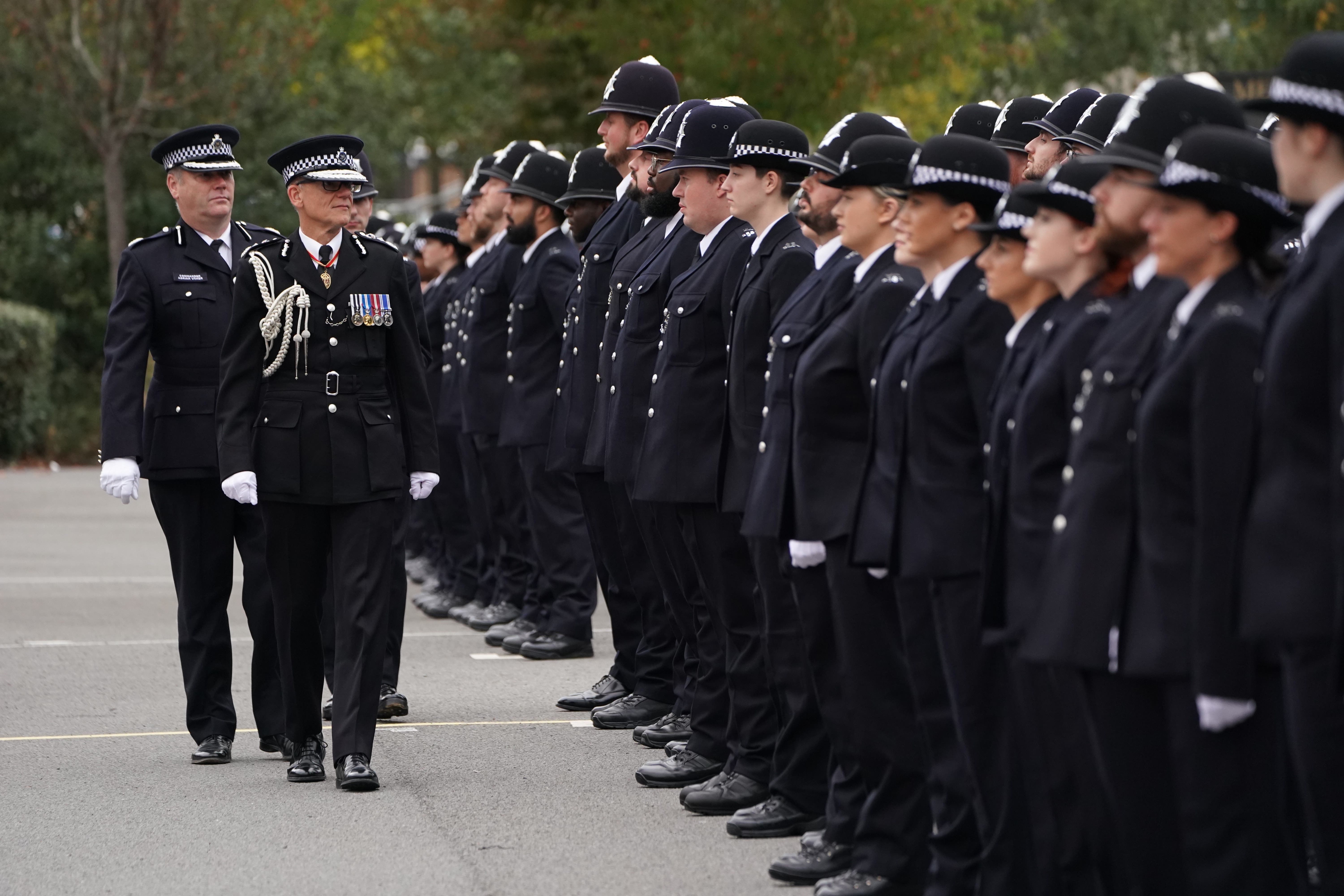More than 1,800 police officers recruited under Boris Johnson’s 20,000 pledge have already quit
Record number of officers resigning over pay, conditions and ‘mismatch’ between expectation and reality of job

More than 1,800 police officers hired as part of Boris Johnson’s pledge to recruit 20,000 extra constables by 2023 have already quit, figures show.
The real number is believed to be much higher, amid warnings over recruits leaving policing over pay, conditions and a “mismatch” between their expectations and the reality of the job.
In his first speech as prime minister in July 2019, Mr Johnson vowed he would put “another 20,000 police on the streets” by the end of March.
The Home Office says it is on track to achieve the target, with more than 15,000 extra officers recruited by October.
But there are concerns that it will not be reached, with official figures showing that an average of 776 officers a month will have to be recruited across England and Wales to hit the target. The average between April and September was 406 a month.
Record resignations also mean that more and more empty posts have to be backfilled to achieve the increase.
Figures obtained in Freedom of Information requests by the i newspaper show that at least 1,837 of those officers who joined under the uplift have already voluntarily resigned.
The real number is likely to be significantly higher, as 19 of the 43 forces in England and Wales failed to provide data.
Among them was the Metropolitan Police, which is the UK’s largest force and was tasked with recruiting the greatest number of officers.
In October, commissioner Sir Mark Rowley said it may not be “possible or wise” to hit its target, because Scotland Yard needed to ensure the quality of recruits and ensure it was “bringing the right people in” following a series of scandals and the murder of Sarah Everard.
The Home Office said that voluntary resignation rates were lower for police officers compared to other sectors, and that a survey of new recruits found that 81 per cent intended to continue as police officers for the rest of their working lives.
A spokesperson added: “The Police Uplift Programme is on track, with 15,343 additional officers already recruited, ensuring police have the support and training they need to bear down on crime.”
A watchdog previously warned that the uplift had created a “heightened danger that people unsuited to policing may get through” because of the speed of recruitment required.
Up to a third of all police officers in England and Wales will be inexperienced constables still in their probation period if all 20,000 are recruited by the end of March.
Because the government pledged that the new officers would be “additional” to existing numbers, more than 50,000 had to be hired over three years to cover for those leaving.
A conference held by the Police Federation in May was told that police forces were under “immense pressure to keep hitting targets” but increasing numbers of officers were resigning voluntarily.
Chief superintendent Sarah Davenport, the change manager for the uplift programme, said officials had “anticipated that around 10 per cent of new recruits would leave” and were working on retention efforts.
Dr Sarah Charman, a criminology professor at Portsmouth University who has been interviewing departing officers, said many felt “let down in various different ways”.
“Firstly there are organisational issues which are leading them to resign, around poor leadership, excessive workloads and a mismatch between what they expected the job to be and the reality,” she said.
“We’re also seeing personal reasons that relate to mental and physical health, caring responsibilities and stress.”
At the same conference, several officers told former home secretary Priti Patel that they were struggling to live on their salaries and were considering leaving policing for better-paid jobs in other sectors.
The government announced an annual funding increase of “up to £523m” for local forces in England and Wales earlier this month, but the figure relies on increases to council tax that would generate £349m.

Individual police and crime commissioners (PCCs) will have to decide whether to implement the rise, balancing the cost of living crisis with the growing demand on police who say they have become the “service of first and last resort” for struggling public services.
The Police Federation, which represents 130,000 rank-and-file officers, called the funding announcement “smoke and mirrors” and that even with the full increase, inflation meant that police were facing a real-terms pay cut.
Police officers in the UK are legally barred from striking, and say they have been “picking up the pieces” from industrial action by sectors including nurses, ambulances and railway workers.
A significant portion of policing demand is now taken up by mental health incidents and medical emergencies, seeing armed officers deployed to cardiac arrests even before ambulance strikes.
Martin Hewitt, chair of the National Police Chiefs’ Council, told a conference in November that there were still fewer police officers and staff than before swingeing cuts began in 2010.
“We all know the country is facing serious economic challenges and the government has extremely difficult decisions to make about public spending,” he added.
“If the uplift in police officers is not maintained, the benefits of the growth since 2019 will be lost. More pressure on other public services means more pressure on the core policing mission.”
Speaking at the same conference, Suella Braverman hailed the uplift and distanced herself from previous cuts to policing.
Asked whether it had been a mistake for the government to cause huge losses of experienced officers over the past decade, she said: “I’m not going to criticise previous Conservative administration decisions. I was not in government at the time.”






Join our commenting forum
Join thought-provoking conversations, follow other Independent readers and see their replies
Comments